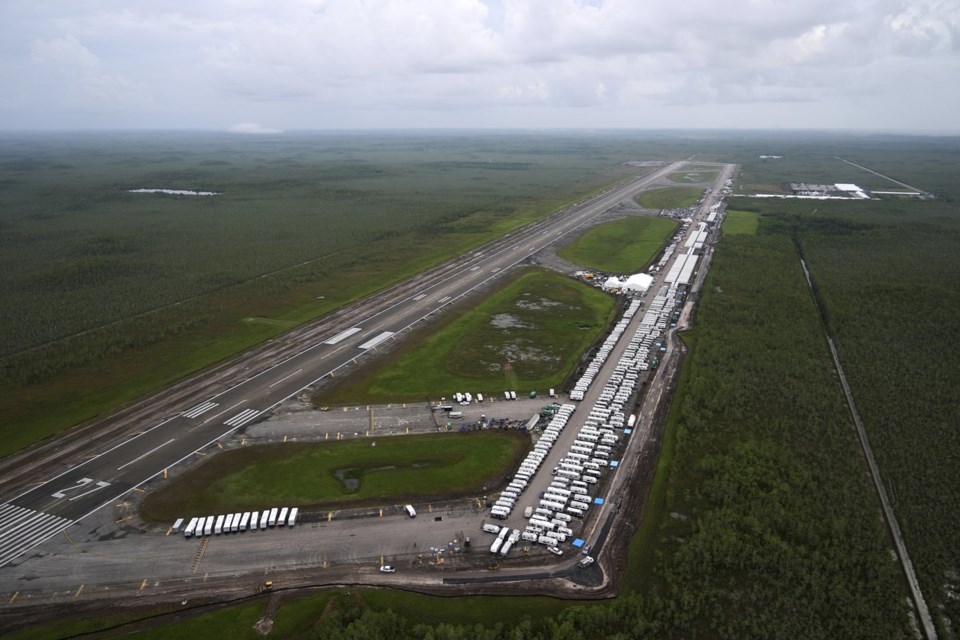MIAMI (AP) — Construction of a makeshift immigrant detention center in the Florida Everglades dubbed “ Alligator Alcatraz ” could be halted indefinitely as a federal judge considered Wednesday whether the hasty development on sensitive wetlands violates environmental laws.
Last week, U.S. District Judge Kathleen Williams ordered a two-week halt on additional construction at the site while witnesses testify. The first phase of “Alligator Alcatraz” opened in July and less than 1,000 detainees were being held there as of last week.
The temporary order doesn’t include any restrictions on law enforcement or immigration enforcement activity at the center, which was built two months ago at a lightly used, single-runway training airport. It's designed to eventually hold up to 3,000 detainees.
President Donald Trump toured the detention center last month and suggested it could be a model for future lockups nationwide as his administration races to expand the infrastructure necessary for increasing deportations.
Inside the compound’s large white tents, rows of bunkbeds are surrounded by chain-link cages. People held there say worms turn up in the food, toilets don’t flush and flood floors with fecal waste, while mosquitoes and other insects are everywhere. At times the air conditioners abruptly shut off in the sweltering heat. Detainees are said to go days without showering or getting prescription medicine, and can only speak to lawyers and loved ones by phone.
Who runs ‘Alligator Alcatraz,’ Washington or Florida?
Environmental groups and the Miccosukee Tribe want the judge to issue a preliminary injunction to halt operations and further construction, which they say threatens environmentally sensitive wetlands that are home to protected plants and animals and would reverse billions of dollars’ worth of environmental restoration.
Plaintiffs presented witnesses Wednesday and Thursday who testified that the facility violates the National Environmental Policy Act, which requires federal agencies to assess the environmental effects of major construction projects.
Attorneys for the state and federal government say that although the detention center would hold federal detainees, its construction and operation is entirely under the state of Florida, meaning a federal environmental review wouldn’t apply.
The judge last week said the detention facility was, at a minimum, a joint partnership between the state and federal government.
The order temporarily barred the installation of any new industrial-style lighting, as well as any paving, filling, excavating, fencing or erecting additional buildings, tents, dormitories or other residential or administrative facilities.
Witnesses describe environmental threats
Witnesses for the environmental groups have testified that at least 20 acres (8 hectares) of asphalt have been added to the site since the Florida Division of Emergency Management began construction. They said additional paving could lead to an increase in water runoff to the adjacent wetlands, spread harmful chemicals into the Everglades and reduce the habitat for endangered Florida panthers.
Amy Castaneda, the Miccosukee Tribe's water resource director, testified Tuesday that nutrient runoff from the detention center could flow into tribal lands, changing vegetation growth. That could lead to fish kills and block humans and wildlife from moving throughout certain areas, she said.
Marcel Bozas, director of the Miccosukee Tribe's fish and wildlife department, said tribe members hunt and fish for subsistence and cultural reasons. He said sustained human activity can drive away game animals as well as protected species.
State official says Florida runs center
Florida's 1,800 state troopers are authorized to detain undocumented migrants under an agreement with the U.S. Department of Homeland Security, said David Kerner, the head of the state's Department of Highway Safety and Motor Vehicles. He testified that Washington doesn't tell Florida where to detain immigrants, and that the Everglades facility was built to alleviate overcrowding at federal, state and county facilities that hold immigration detainees.
Kerner couldn't say how many of the “Alligator Alcatraz” detainees have been charged with violent crimes or whether any other sites besides the middle of the Everglades were considered for possible detention centers.
Attorneys for federal and state agencies last month asked Williams to dismiss or transfer the injunction request, saying the lawsuit was filed in the wrong jurisdiction. Williams had yet to rule on that argument.
Facility faces a second legal challenge
Over the weekend, a federal judge gave the state until late September to prepare arguments against an effort to get the civil rights litigation certified as a class action.
That second lawsuit claims detainees’ constitutional rights are being violated because they are barred from meeting lawyers, are being held without any charges, and a federal immigration court has canceled bond hearings.
The lawsuits were being heard as DeSantis′ administration apparently was preparing to build a second immigration detention center at a Florida National Guard training center in north Florida.
David Fischer, The Associated Press



